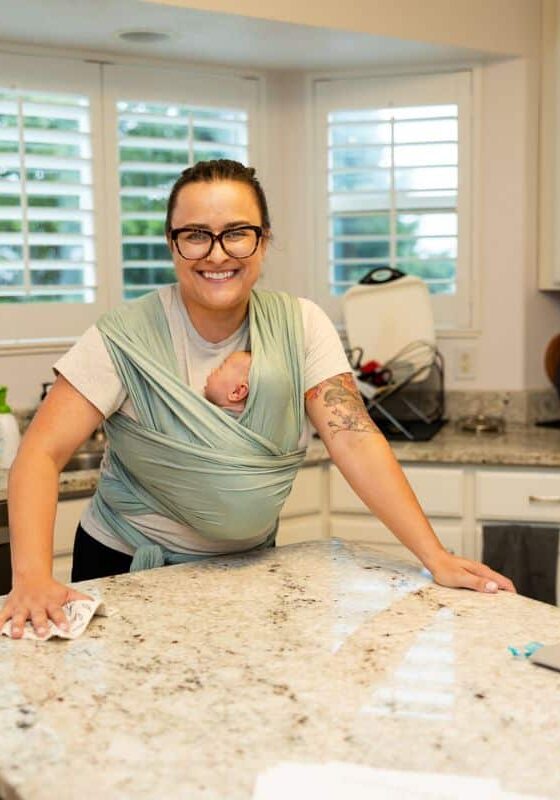
Do you feel prepared for your first weeks with your baby?
You’ve spent countless hours preparing for the birth of your baby, scrolling the internet for the most current birth info, reading books, taking classes, and imagining your optimal birth. But what about the days and weeks after your baby makes their grand entrance?
The “fourth trimester” (the first 3 months of your baby’s life) is a time of big transitions, both for your newborn and yourself.
Not only are you recovering from the huge physical feat of birthing a baby, but you are now learning how to keep your newborn happy and healthy, making sure they (and you!) stay fed, wearing an adult diaper to manage your postpartum bleeding, and leaking milk through your shirt, all while running on little sleep and lots of hormones.
And then your in-laws want to swing by for a visit! It’s a LOT to manage, and it can feel very overwhelming for new parents.
Ubiased information, hands-on support for your first weeks and months as a new family.
Our postpartum doulas provide unbiased information, hands-on newborn care, assistance with household tasks, and unwavering emotional support of all members of your family as you adjust to parenthood. We are available for shifts during the day and overnight, so that you can have peace of mind around the clock.
Postpartum doula services begin at $50/hour.
your postpartum doula is ready to meet you!

Frequently Asked Questions
salt lake city families love our postpartum doulas
"We are so grateful. We connected with Heart Tones during a very difficult time as extremely sleep-deprived parents to newborn twins. We are so glad we made the choice to invest in overnight care. On each doula night, it was such a weight off our chest to be able to go to bed knowing that our babies would be cared for so that we could get some precious uninterrupted sleep! It truly made a difference in our quality of life as newborn parents, having a guaranteed full night of sleep every few days. Our postpartum doulas were so knowledgeable and experienced. They would even text on their off nights to answer our questions, give tips and advice, and just check in on the babies. I am so sad we don't get to work with our doulas anymore now that our services are complete! Again we appreciate Heart Tones so much and we are so glad we found them when we did."
"Our postpartum doulas helped us through all of the new parent questions like soothing techniques, gas relief, sleep routines, pumping, and much more. They were fabulous night doulas, giving us the gift of extra sleep and trusted overnight baby care."
"Our postpartum doulas were so knowledgeable and experienced. They would even text on their off nights to answer our questions, give tips and advice, and just check in on the babies. I am so sad we don't get to work with our doulas anymore now that our services are complete! We are so glad we found them when we did."
"Both our doulas were so sweet, supportive, and encouraging. I appreciated every time they would listen to my endless questions and talk through things - you really feel so cared for. I seriously can’t thank Heart Tones enough! We feel this was one of the best decisions we made in preparing for our new baby."
"Honestly not sure how we would’ve survived without Heart Tones and our sweet postpartum doulas! As first time parents, we were expecting to feel out of our element but what we weren’t expecting was to have such a tough start. I had some medical issues right after birth and a really tough recovery along with a return hospital stay. Our postpartum doulas gave us some stability and much needed sleep during such a difficult time. We did a few overnight shifts a week and it was a lifesaver. Being able to rest and recover at night while knowing our baby was safe with someone knowledgeable caring for him was such a relief."
How to find your ideal Salt Lake City postpartum doula:
We are your personal doula matchmaker, connecting you with the doula that will be the very best fit for you, your family, and your unique needs.
1. Fill out our inquiry form
Tell us a little more about you, your family, and the postpartum care you're looking for through our inquiry form. Let us know if you're looking for daytime, overnight, or travel doula care. Then book a free discovery call with founder Beth Hardy.
2. Meet your doula match
Within 48 hours we match you with a doula who is the best fit for you. In many postpartum cases, we will put together a team of 2-3 doulas who will all take turns working shifts. Then comes the fun part - meeting your prospective doula(s) to chat and learn more about their specific skills. Our interview process ensures it’s the ideal fit.
3. Welcome to the heart tones community!
Once you've decided on your perfect postpartum doula, we will be right here every step of the way through the booking process. We can help with scheduling, setting up back-up doula support, and anything else you need. Sit back, take a deep breath, and enjoy personalized support during your postpartum.
